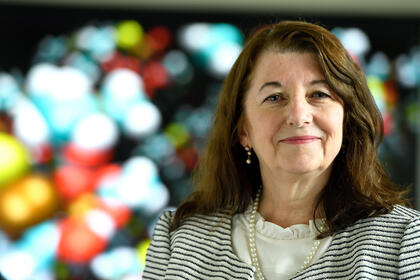- Name
- Johns Hopkins Media Relations
- jhunews@jhu.edu
- Office phone
- 443-997-9009
Johns Hopkins and Morgan State universities have been awarded a $2.7 million National Science Foundation grant to launch an innovative training program in AI-guided semiconductor and microelectronics processing. Funded through NSF's National Research Traineeship (NRT) initiative, the program is designed to cultivate a diverse workforce armed with expertise in AI and microelectronics.
"The microelectronics industry is undergoing a welcome renaissance in the U.S., thanks to the Biden CHIPS and Science Act, which aims to revitalize this critical sector," said Paulette Clancy, a professor in the Whiting School of Engineering's Department of Chemical and Biomolecular Engineering and Hopkins' principal investigator on the team. "Microelectronic devices such as phones, TVs, and laptops are an indispensable part of our lives and society expects their performance to continue to grow."

Image caption: Paulette Clancy
Image credit: Will Kirk / Johns Hopkins University
The program will focus on four areas of new AI-driven development: low-dimensional and quantum materials; materials for advanced semiconductor manufacturing; advanced computing hardware; and next-generation electronics for new environments and applications.
"These research areas will help define the future of information and communications technology and ensure that we satisfy high-performance needs while being more energy-efficient, secure, and resilient," said co-PI Thomas Kempa, a professor of chemistry in JHU's Krieger School of Arts and Sciences and co-director of JHU's Hub for Imaging and Quantum Technologies.
Guided by 25 JHU/Morgan State faculty members whose research lies at the forefront of creating new materials, new fabrication, and new business endeavors, the program's approximately 70 students will use AI to reimagine how microelectronic devices are designed and fabricated, exploring new materials and new processes, and creating new approaches to ensuring supply-chain resilience.
The training program will not only contribute to AI development but also provide graduate students with valuable practical experience in building devices. Training includes semiconductor fabrication experience, internships at participating companies, networking and workshops, and personalized career advice.
"This team brings expertise and perspectives from all over the JHU and nearby Morgan State campuses to train the kind of multidisciplinary science/engineers needed in the emerging AI industry. The ability of our students to navigate between domain science and AI-driven engineering solutions will undoubtedly set them apart," said co-PI Rigoberto Hernandez, a professor in the Department of Chemistry in the Krieger School.
However, the program's goals extend beyond enhancing participants' technical skills. According to Pam Sheff, co-PI and director of WSE's Center for Leadership Education, it will also develop well-rounded professionals equipped with business knowledge and acumen.
"Students will also gain the management expertise to lead and implement innovation, including creating business plans, combatting AI bias, improving cybersecurity, and upholding ethical practices," she said.
Clancy expects the initiative to establish Hopkins at the forefront of cultivating a more inclusive microelectronics workforce, leveraging the strengths of both JHU and Morgan State to educate and prepare the next generation of innovators in this critical field.
"This award will help us create a ground-breaking training program for students who will bring about a revolution in AI-guided microelectronics and strengthen U.S. competitiveness in a critical set of industries. They will graduate with essential scientific knowledge that will distinguish them as industry leaders," Clancy said.
The co-principal investigators from WSE at Hopkins include Amy Foster from the Department of Electrical and Computer Engineering. The Morgan State University faculty team, led by PI Onyema Osuagwu, includes co-PIs and AI expert Kofi Nyarko, and fabrication expert and Department of Electrical & Computer Engineering Head Michael Spencer.
The NSF's NRT program funds interdisciplinary graduate education initiatives to develop a skilled STEM workforce. It supports new training methods in important areas of national priority, developing scientists to handle complex challenges in science and engineering.
Posted in Science+Technology
Tagged krieger school, artificial intelligence, whiting school







